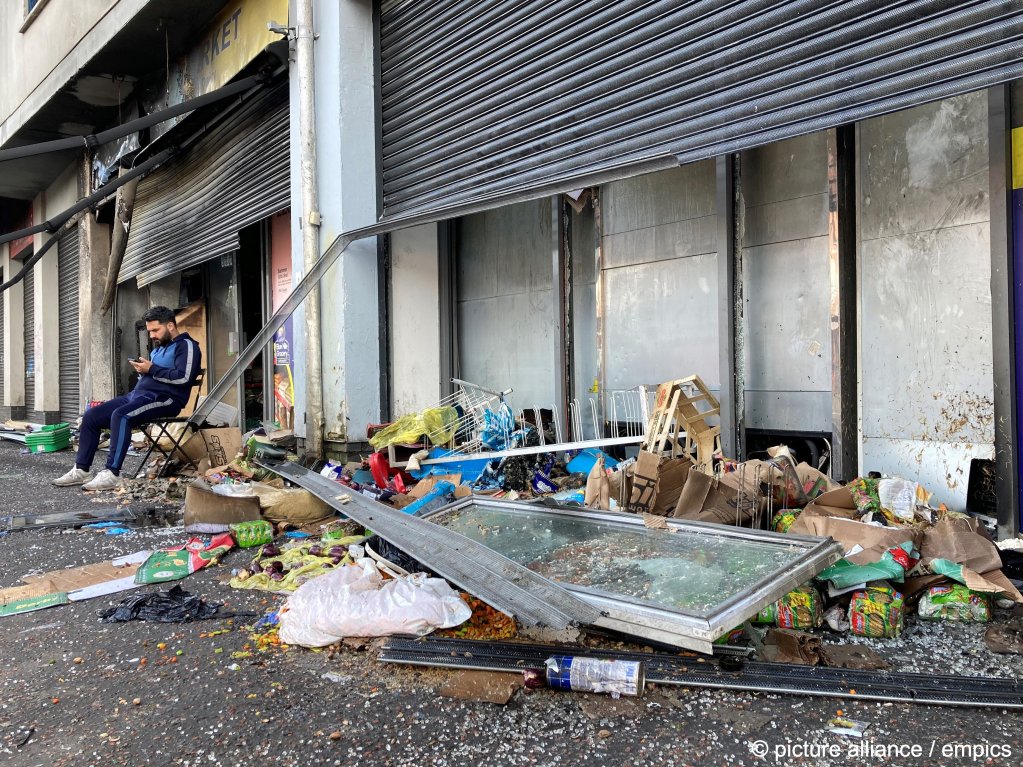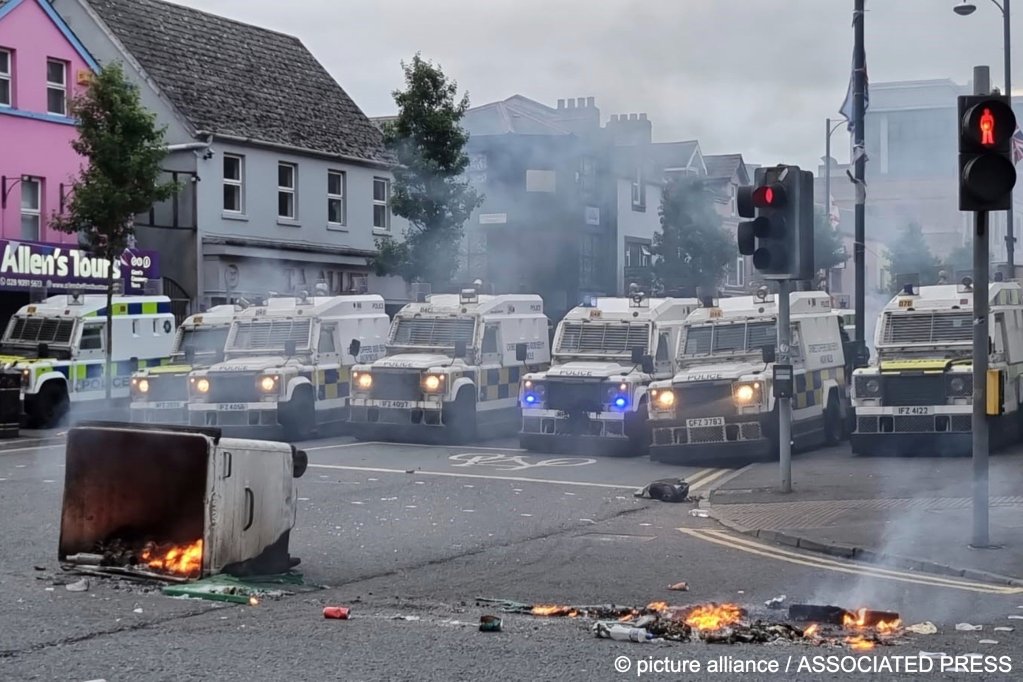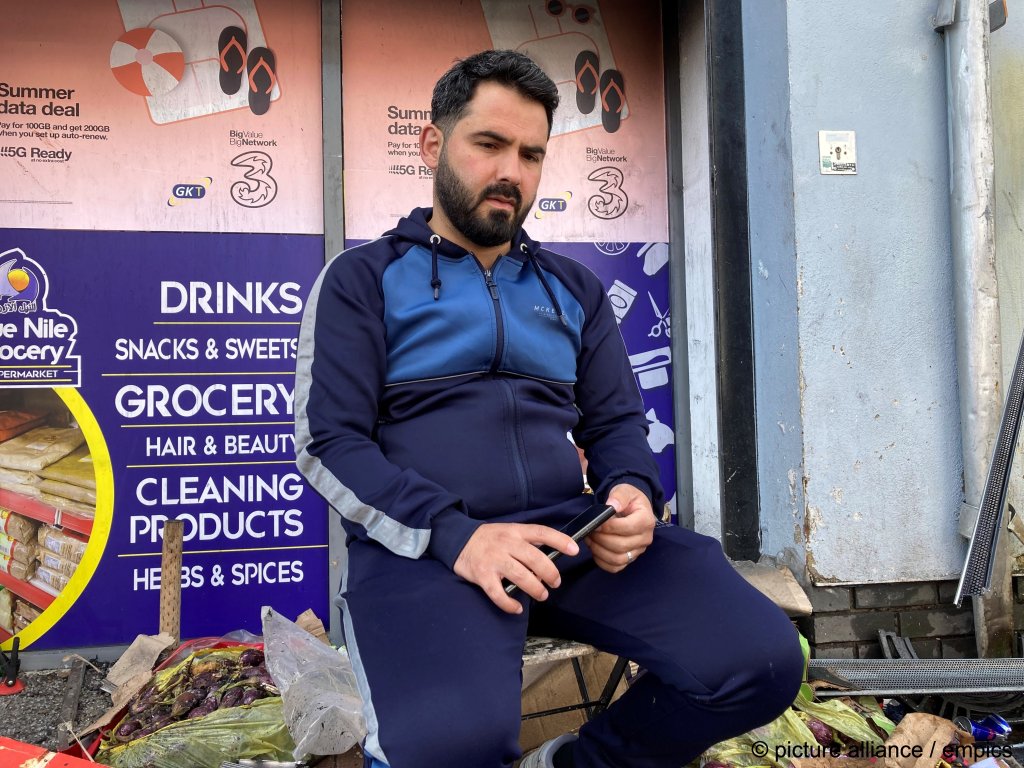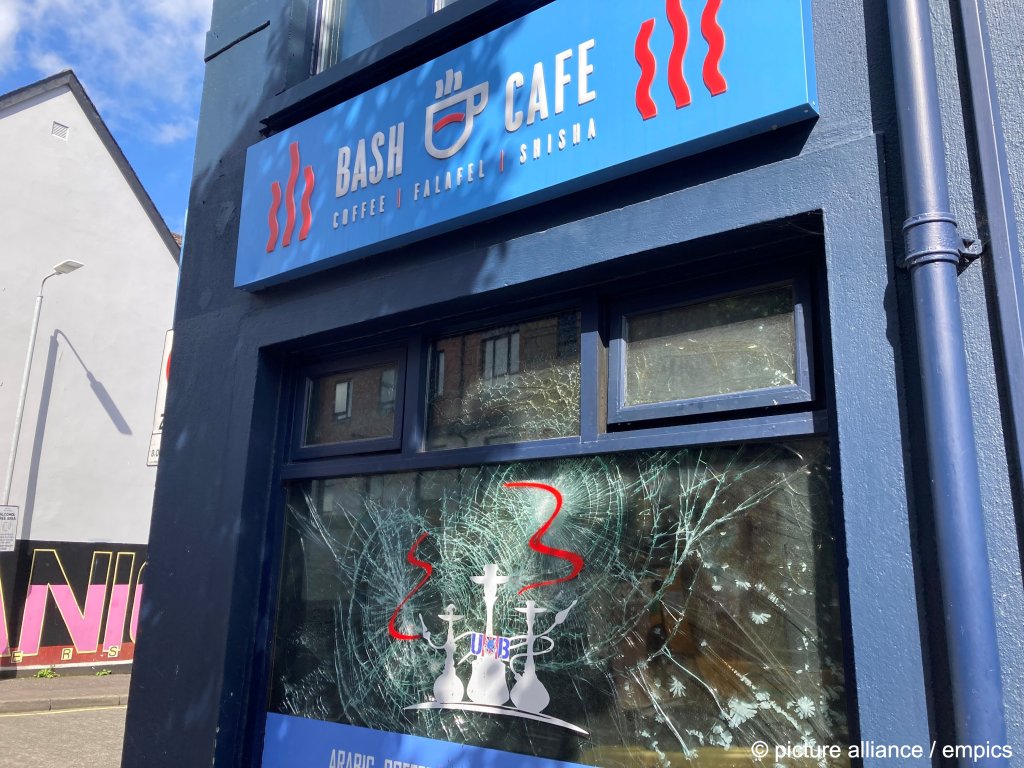Anti-migrant and anti-Muslim protests have flared in the Northern Ireland capital Belfast. Police and local businesses have come under attack, and the victim of a suspected hate crime remains in a serious condition.
The latest episode of violence following anti-migrant riots broke out in Belfast late on Monday (August 5) in the evening. Two businesses had already been attacked in the Sandy Row area of Belfast on Saturday.
The violence, which has been progressing in towns and cities across the UK for over a week, was initially sparked by a fatal knife attack on a children's dance class in the town of Southport, not far from Liverpool.
The teenager charged with perpetrating the attack was born in the UK to parents originally from Rwanda. Authorities say the subsequent spread of disinformation surrounding his identity contributed to a rise in anti-immigrant violence in many parts of the country.
Also watch: UK PM slams 'far-right thuggery' after more anti-immigrant violence
Zero tolerance of racism and destruction
The Police Service Northern Ireland (PSNI) has come out in force to try to stop an escalation of the violence taking place in the most multi-ethnic area of Belfast.
In a statement, it said officers had come under attack with petrol bombs, heavy masonry and bricks. A police vehicle was also doused with petrol and set alight.

Police said witnesses had reported seeing a man being assaulted, his attackers stamping on his head as members of the public attempted to shield him from further attack. "His condition is described as serious and we are treating his attack as a hate crime," stated PSNI.
At least one family home was reportedly damaged, with windows broken. Police also said officers had been attacked by masked rioters.
The Northern Irish parliament has called a special meeting to respond to the violence and protests. In a joint statement, First Minister Michelle O’Neill and deputy First Minister Emma Little-Pengelly said there would be a "zero tolerance approach to racism and wanton destruction."
Also read: Multiple influencers behind protests in the UK that turned violent
Temporary Assistant Chief Constable Melanie Jones said Northern Ireland police are talking to those affected by the violence. "We are gathering evidence, CCTV and other footage to progress criminal investigations," she said.
"We are determined to identify those responsible and bring them to justice."

'Tense situation'
Sinn Féin party representative for South Belfast Deirdre Hargey said she believed it was mainly young people involved in the unrest.
The politician described the situation as "tense", but added the police had brought it under control.
At the same time, reports that anti-migrant activists from the Republic of Ireland planned to join Belfast riots were met with a strong warning from Irish Justice Minister Helen McEntee.
'Everything we built is gone'
On Saturday night, when the violence started in Belfast, both Syrian and Sudanese businesses were targeted. For Abdelkader Al Alloush, who fled the war in Syria, this was not the first time he had suffered targeted attacks.
According to the Irish News, Al Alloush had spent three years building up the Sham Supermarket on Donnegall Road in south Belfast. On Saturday it was set on fire during the violence. In less than three hours, he said, "everything we built is gone."
Also read: Asylum seekers trying to escape 'Rwanda policy' flee to Ireland

Bash Café, also on Donegall Road, was another shop gutted by fire. Sudanese owner Mohammed Idris told the Irish News that windows had been smashed in the family-owned business around 3pm on Saturday.
Idris, who has been in Northern Ireland for ten years, said he heard some of the people calling him by name as they attacked the shop.
"It’s so sad and heart-breaking to see your business you established, put all your effort, your money into…unfortunately, everything went down," Idris said.

He told the Irish News that he felt police could have done more to intervene. "Police trucks were everywhere here, and people were burning the café. It’s strange," he said.
'They don't want us to feel safe'
Another member of the Syrian community, Sam Yousef, commented: "We are working hard, trying to pay tax, trying to contribute to society." Yousef said he felt the violence was "a big alarm that something is not right. They don’t want us to feel safe."
Yousef said that the violence had taken members of his community "back..to where we come from, the warzone in Syria." He said that in Northern Ireland they had hoped to feel safe, "but when we saw this, it made us feel completely unsafe again."
In September 2023, BBC Northern Ireland reported that another Syrian business on Donegall Road, owned by Ahmad Alkhamran, suffered four racially-motivated attacks in two weeks.
Small minority against migrants
While those attacks prompted him to move his business elsewhere, Alkhamran said that most people he had met in Northern Ireland had made him feel welcome.
South Belfast representative Deirdre Hargey said she believed it was only a small minority who opposed immigrant-run businesses. "This is a disgusting attempt to create fear and stir up hate," she told the BBC.
"There is no place for this kind of behavior in our society and is not reflective of the people of south Belfast."
A fundraiser to support some of the targeted businesses had already raised 11,000 pounds by noon on Sunday, according to the Irish News.
